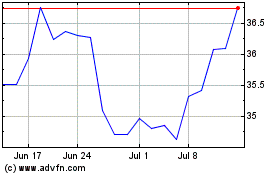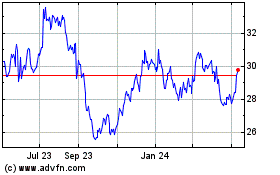By Eva Dou and Li Yuan
China has proposed strengthening its policies on internet safety
for children, which could force technology companies to make
substantial operational changes to meet the new requirements.
The draft rules would require online-game operators to lock out
anyone under the age of 18 between midnight and 8 a.m. They would
also call for an increased number of websites to post warnings
about content deemed unsuitable for minors.
Few companies will criticize Chinese policies openly. However,
industry experts said that a strict implementation of the proposed
rules could also force foreign companies to use Chinese censorship
software that they can't control and that could potentially serve
as backdoors for Chinese surveillance.
The rules cover "smart devices," so they would affect all makers
of computing devices sold in China, including Apple Inc., Dell
Inc., HP Inc. and others.
The proposed regulations posted online Sept. 30 are vague as to
whether companies' existing parental control systems would suffice
or if they would have to use Beijing-approved software. The
Cyberspace Administration of China, the country's internet
regulator, said that it would support the development of
web-filtering software to keep children safe online and would
determine which products comply with its requirements.
The proposal is the latest in a string of measures requiring
technology companies to help make China's web filters, known as the
Great Firewall, more forbidding. Private tech companies are already
required to police their own platforms for problematic content.
The draft rules contain echoes of China's attempt in 2009 to
require all personal-computer makers to include Green Dam,
controversial censorship software intended to shield children from
inappropriate content. The requirement was quickly scrapped after
it was met with widespread outcry over concerns that the software's
functions were unclear and that it could be used for
surveillance.
Industry experts, however, said the latest proposal so far
appeared to be less alarming, with its vague wording leaving open
the possibility that companies will be able to use in-house
software, unlike in 2009. Companies such as Apple already have
parental control settings installed on their devices. Apple said it
couldn't comment on the rules as they aren't final. The rules are
open for public comment until Oct. 31.
"Any policy which may require compulsory software installation
does pose operational challenges to hardware manufacturers," said
Jake Parker, vice president of China operations of the U.S.-China
Business Council.
Some of China's new child-protection measures are similar to
those in the West, such as "default-on" filtering of adult content
for all internet connections in the U.K., said Oliver Farnan, a
researcher at the Oxford Cyber Security Centre.
But if smartphone companies do end up having to preload
government censorship software, it could aid Chinese censors in
monitoring encrypted communications, which is one weakness in
current surveillance, according to censorship experts. This had
been a major concern regarding Green Dam.
"Protecting the well-being of China's youth is often used as a
rationalization for far-reaching controls on media and information
that impact all Chinese citizens," said David Bandurski, a
researcher at the China Media Project.
Hu Miao, who has a 6-year-old daughter and lives in Beijing,
said she would prefer the option of loading web-filtering software
onto a phone herself, but said she could see the merits of
preloaded software if it were a teenager buying a device.
"I think the most important thing is still good parenting," she
said.
Internet companies might have to make only limited changes under
the new rules as they already must block much content deemed
inappropriate for minors--such as pornography, gambling and
antigovernment messages--under existing laws.
Gaming companies are required to implement antiaddiction systems
under current law, including limits on the amount of time minors
can spend playing games, according to Beijing Kunlun Tech Co., a
major online-game publisher. Blocking minors from playing after
midnight wouldn't be difficult from a technical standpoint because
companies already require players to provide verifiable personal
information including their name and age, Kunlun said.
Baidu Inc., China's leading search engine, said Tuesday it has
already invested heavily in recent years to clamp down on
"unhealthy information."
"We will actively enforce the new regulations to protect our
users, especially children," it said.
Alibaba Group Holding Ltd., which has approximately 500 million
active users on its e-commerce and other platforms, and Tencent
Holdings Ltd., China's largest social-network operator and
online-gaming company, both said they always abide by local
laws.
China has adopted increasingly strict controls over internet
content in recent years, often in the name of national security or
moral values. Some of the measures have led to serious headaches
for foreign companies, such as requirements to prove products are
safe through intrusive testing, while others have just emphasized
standards already in place.
"Although these are definite expansions [from] those set out
previously, there's nothing necessarily shocking there," said Mr.
Farnan, the Oxford researcher.
--Alyssa Abkowitz and Juro Osawa contributed to this
article.
Write to Eva Dou at eva.dou@wsj.com and Li Yuan at
li.yuan@wsj.com
(END) Dow Jones Newswires
October 12, 2016 13:35 ET (17:35 GMT)
Copyright (c) 2016 Dow Jones & Company, Inc.
HP (NYSE:HPQ)
Historical Stock Chart
From Mar 2024 to Apr 2024

HP (NYSE:HPQ)
Historical Stock Chart
From Apr 2023 to Apr 2024
